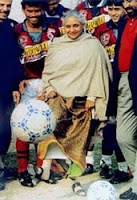She's Sheila Dixit, the chief minister of the capital of India, New Delhi. She has made New Delhi a green belt with parks and roundabouts gracing this historic city. She's also been the first to enforce that vehicles plying in Delhi convert to the more environment-friendly compressed natural gas, CNG. She's a progressive leader and with an ability to charm the voting public into re-electing her into office, the second time around.
But she didn't come into politics with any burning ambitions, she happened to be married into a political family and as a result, was immersed in the hurly-burly of events. Being the daughter-in-law of the freedom fighter, Uma Shankar Dixit, she was asked to contest the election from East Delhi, which she did and lost by 40,000 votes.
So the girl who studied history at Miranda House and who wanted to become either a writer, an artist or even Florence Nightingale was thrown into the poltical battlefield. She admits, it has not been easy for even someone with her kind of background and connections.
Preparing yourself for defeat is always tough on novices, and she was no exception. But she was inspired by Indira Gandhi and the ideology she stood for, so she persevered. Later in 1984, when she was formally inducted into politics, she saw another young leader emerge - who could lead India to greater heights - Rajiv Gandhi.
Studied history at Miranda House.
Wanted to be either a writer, an artist or Florence Nightingale!
In 1984, inspired by Indira Gandhi, she joined politics.
Sheila Dixit does understand the importance of being a woman leader. She finds it easier to appeal to women voters on economic issues because they would give her a patient hearing, rather than a male politician. But there are not many women who chose to get into this profession. She told CNBC-TV18, "Politics is really rough and tumble and there are highs and there are lows. There is a lot of uncertainty and perhaps very often, if I am not using too strong a word, the indignity and the unsurety of this career does not attract many women."
"That is why even though I was a little skeptical on whether 33% (reservations for women) ought to be given or not. I do feel now, it should be given because if you really want that segment of a civil society, to get into areas where decisions are taken, where futures are determined, I think it is necessary for women to be there."
Initially, she claims she didn't give the women's reservation idea any thought - either for or against it - but now "after this experiment with the panchayats and the nagar palikas, where women have come into public life, I have evolved my thoughts on this."
She has implemented some programmes like the Resident Welfare Associations, RWA and the people participatory programme called Bhagirdari. She advises people to be a little patient to see results and good communication is the key.
She explained, "Councillors should not feel threatened by them (RWAs). This is a kind of socio-political movement rather than any power grabbing movement. I remember the last time when we went in for elections, our opposing parties also tried to grab these RWAs - that this party seems to have reached out to people so let’s also do it - and they asked them over to teas and dinner but nobody got taken in!"
About the Bhagirdari project, she says there is awareness spreading about it. She elaborated, "People understand what bureaucracy is, you can’t tell a bureaucrat 'I want this and I don’t care how you get it', because the bureaucracy works with certain regulations and disciplines. But to understand those disciplines is important for the community, and it's important for the bureaucrat to understand what the community wants. So we called it governance through partnership."
 She has had to reach out to people from across the social strata and deal with their problems, but women still find Delhi a problematic city, in terms of their safety. The irony not being lost on many, that Delhi is the capital of India and with a woman chief heading it!
She has had to reach out to people from across the social strata and deal with their problems, but women still find Delhi a problematic city, in terms of their safety. The irony not being lost on many, that Delhi is the capital of India and with a woman chief heading it! She acknowledges, "There are two aspects to this problem, one is social and the second is the policing. People must have confidence in the policing system. I am afraid, somewhere we have not been able to bring around that confidence. Unfortunately, the police does not happen to be with the state government. We are trying now through our Women's Commission and other things to make women aware of what they need to do. Girls need to protect themselves. The immediate thing the government is thinking of, is to have more women in the police force."
So many issues that need sorting out, with every day bringing more challenges. So is she looking at a third term? She said, "No, I am far too preoccupied with seeing that we achieve things in this term." But she's had to prove herself to get the success she's currently enjoying because she admits, "The expectations from you are much more somehow because the skepticism about a woman’s capability is there."
Even now, women are given the softer portfolios like health and education or social welfare. There has been a woman prime minister but never a woman defence minister. That is what's so contradictory about the Indian polity. So when Sheila Dixit makes a mark, as a woman CEO of a city-state, it's time to take a bow.
Written for moneycontrol.com


